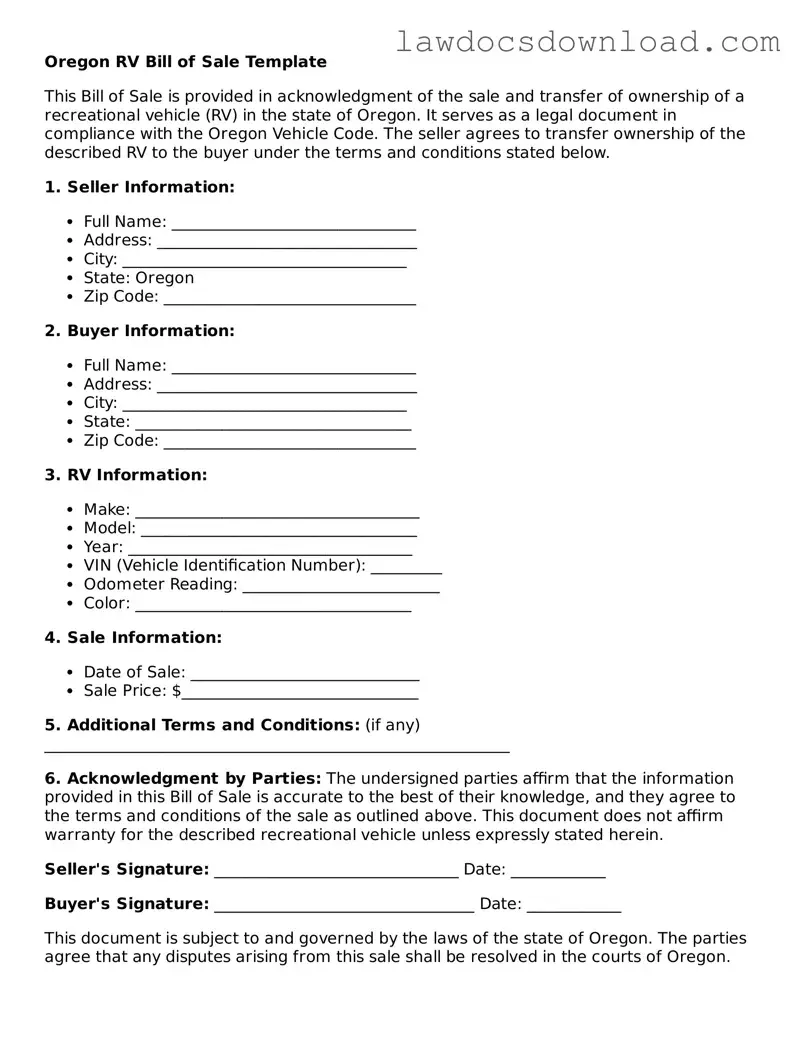The Oregon RV Bill of Sale form shares similarities with the Vehicle Bill of Sale, primarily used when buying or selling cars, trucks, motorcycles, and boats. Both documents serve as proof of transaction between the buyer and seller, detailing the date of sale, purchase price, and identification of the sold item. They are crucial for the new owner's registration process, indicating a transfer of ownership legally recognized by the respective state authorities.
Similar to the Oregon RV Bill of Sale is the Equipment Bill of Sale, which covers the sale of machinery, office equipment, and other substantial assets. Like the RV Bill of Sale, it lists the item sold, both parties’ information, and the sale's terms and conditions. This documentation is essential for businesses that need to keep accurate records of their capital assets for accounting and taxation purposes.
Another related document is the Firearm Bill of Sale. Although it pertains to the transfer of ownership of a firearm, it bears resemblance to the Oregon RV Bill of Sale by providing a legal record of the sale, including details about the buyer, seller, firearm, and the transaction date. This form is particularly important for background checks and ensuring the legal sale and ownership of firearms.
The Mobile Home Bill of Sale is akin to the Oregon RV Bill of Sale, focusing on the transaction involving a mobile home. Both forms act as definitive proof of sale and include similar key information: identities of buyer and seller, sale price, and a detailed description of the mobile home or RV. This document supports the legal process for transferring a mobile home's title and establishing rightful ownership.
Likewise, the Boat Bill of Sale mirrors the Oregon RV Bill of Sale, catering specifically to the sale of boats. It records essential details such as the make, model, and year of the boat, alongside seller and buyer information. This bill is indispensable for registration and titling processes, ensuring that the transaction adheres to legal standards and the boat's ownership is properly transferred.
The Horse Bill of Sale is another comparable document, though it focuses on the purchase and sale of horses. It contains details similar to those in an RV Bill of Sale, like the parties' names, transaction date, and a description of the horse being sold. This document is vital for ownership transfer and may include additional terms related to the horse's health and return policy.
The General Bill of Sale form is broader in scope but shares the purpose of documenting the sale of personal property, whether it's furniture, electronics, or miscellaneous items. It serves as a receipt for the transaction, specifying the item's condition, sale amount, and agreement details. Although it encompasses a wide range of items, its function as proof of purchase and transfer of ownership ties it closely to the Oregon RV Bill of Sale.
Similar in utility is the Aircraft Bill of Sale. It documents the sale of an airplane, providing a detailed account of the transaction, baring similarities by listing the aircraft's make, model, serial number, and the particulars of the buyer and seller. This form is essential for the Federal Aviation Administration (FAA) registration process, mirroring the RV Bill of Sale's role in vehicle registration.
The Pet Bill of Sale is for transactions involving animals, particularly pets. Like the Oregon RV Bill of Sale, it includes descriptions of the pet, such as breed, age, and health information, alongside sale terms. This document is crucial for those buying or selling pets, ensuring the animal's welfare is considered and ownership is rightfully transferred.
Lastly, the Artwork Bill of Sale parallels the Oregon RV Bill of Sale by documenting the transfer of valuable art pieces between parties. It highlights the artist, title of the artwork, year of creation, and conditions of the sale. The document serves not only as proof of the transaction but also as a record of provenance, which is vital for the art's historical value and future appraisal.

